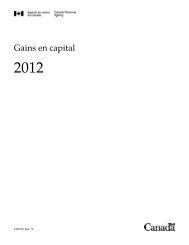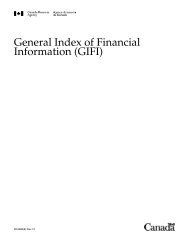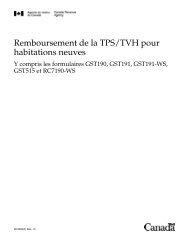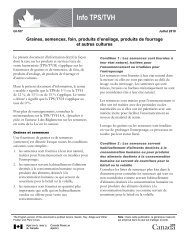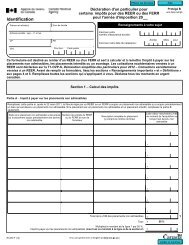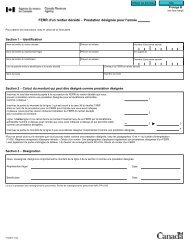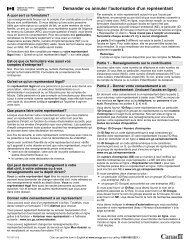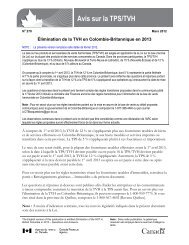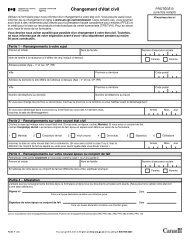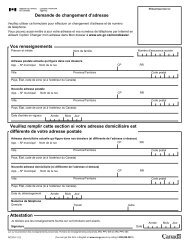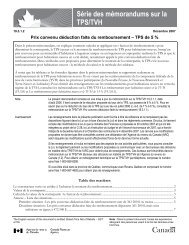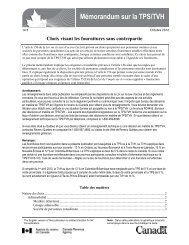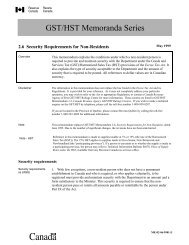GST/HST Memoranda Series - Agence du revenu du Canada
GST/HST Memoranda Series - Agence du revenu du Canada
GST/HST Memoranda Series - Agence du revenu du Canada
Create successful ePaper yourself
Turn your PDF publications into a flip-book with our unique Google optimized e-Paper software.
<strong>GST</strong>/<strong>HST</strong> <strong>Memoranda</strong> <strong>Series</strong><br />
4.5.3 Exports – Services and Intellectual Property<br />
June 1998<br />
Overview This section provides information on supplies of services (Part One) and intellectual<br />
property (Part Two) that are listed in Part V of Sche<strong>du</strong>le VI to the Excise Tax Act as<br />
zero-rated exports for purposes of the Goods and Services Tax (<strong>GST</strong>) and the<br />
Harmonized Sales Tax (<strong>HST</strong>). Information on supplies of tangible personal property is<br />
provided in Section 4.5.2, Exports - Tangible Personal Property. Information on the<br />
criteria for determining the non-residence status of persons to whom supplies are made<br />
in order to determine whether a supply may be zero-rated to that person is provided in<br />
Section 4.5.1, Exports - Determining Residence Status.<br />
Disclaimer The information in this memoran<strong>du</strong>m does not replace the law found in the Excise Tax Act and<br />
its Regulations. It is provided for your reference. As it may not completely address your<br />
particular operation, you may wish to refer to the Act or appropriate Regulation, or contact a<br />
<strong>Canada</strong> Revenue Agency (CRA) <strong>GST</strong>/<strong>HST</strong> Rulings Centre for more information. These<br />
centres are listed in <strong>GST</strong>/<strong>HST</strong> Memoran<strong>du</strong>m 1.2, <strong>Canada</strong> Revenue Agency <strong>GST</strong>/<strong>HST</strong> Rulings<br />
Centres. If you wish to make a technical enquiry on the <strong>GST</strong>/<strong>HST</strong> by telephone, please call the<br />
toll-free number 1-800-959-8287.<br />
If you are located in the Province of Quebec, please contact Revenu Québec by calling the tollfree<br />
number 1-800-567-4692 for additional information.<br />
Note This section of Chapter 4 supersedes paragraphs 72 to 114 of <strong>GST</strong> Memoran<strong>du</strong>m 300-3-5,<br />
Exports. Due to the number of revisions, the changes have not been side-barred.<br />
[Proposed<br />
amendments]<br />
Part One - Services<br />
[Where information reflects proposed amendments, the information is enclosed in square<br />
brackets.] In this section, the proposed amendments that are reflected through the use of square<br />
brackets arise from the Notice of Ways and Means Motion that was tabled on March 21, 1997.<br />
Any commentary in this section should not be taken as a statement by the Department that such<br />
amendments will in fact be enacted into law in their current form.<br />
Supplies to unregistered non-resident carriers<br />
Services made to nonresident<br />
operators of<br />
ships, aircraft or<br />
railways<br />
Sch. VI, Part V, s 2<br />
1. A supply of a service (other than a sale of real property) made to non-resident<br />
operators of ships, aircraft or railways, who are not registered at the time the supply is<br />
made, is zero-rated where the supply is acquired by the operator for consumption, use<br />
or supply<br />
ME-04-05-03-9801-E
4.5.3 Exports - Services and Intellectual Property (continued)<br />
(a) where the person carries on a business of transporting passengers or property to or<br />
from <strong>Canada</strong> or between places outside <strong>Canada</strong> by ship, aircraft or railway, in the<br />
course of so transporting passengers or property;<br />
Note: The phrase “between places outside <strong>Canada</strong>” refers to situations where<br />
transportation of property or passengers does not originate or terminate in<br />
<strong>Canada</strong>, but where the conveyance travels through <strong>Canada</strong>, resulting in the<br />
zero-rating of supplies.<br />
(b) in the course of operating a ship or aircraft by or on behalf of a government of a<br />
country other than <strong>Canada</strong>; or<br />
(c) in the course of operating a ship for the purpose of obtaining scientific data outside<br />
<strong>Canada</strong> or for the laying or repairing of oceanic telegraph cables.<br />
2. Examples of supplies that would be zero-rated, provided that the conditions of<br />
section 2 of Part V of Sche<strong>du</strong>le VI are met, include:<br />
• services supplied to an unregistered non-resident person in the operation of a ship,<br />
aircraft or railway, including services in respect of real property such as aircraft<br />
landing fees, railway right-of-way charges, warehouse fees, etc.,<br />
• repair and maintenance services,<br />
• railway junction and switching services, and<br />
• pilotage services.<br />
More information 3. Additional information on tangible personal property is available in Section 4.5.2,<br />
Exports - Tangible Personal Property, of this Chapter.<br />
[Air navigation services]<br />
[Sch. VI, Part V, new<br />
s 2.2]<br />
4. Supplies made to an unregistered non-resident person operating a ship, an aircraft<br />
or a railway, where the supplies are not for consumption, use or supply in the course of<br />
transporting passengers or property are not zero-rated. For the supply to be zero-rated,<br />
the ship, aircraft or railway must be in service (i.e., on its way to a destination).<br />
5. [An amendment proposes to zero-rate air navigation services supplied to air carriers<br />
registered for the <strong>GST</strong>/<strong>HST</strong> in relation to international flights when transporting<br />
passengers or property. This would apply to services performed after March 1997.]<br />
Section 4.5.3 <strong>GST</strong>/<strong>HST</strong> <strong>Memoranda</strong> <strong>Series</strong><br />
page 2 (Nov-06) Chapter 4: Zero-Rated Supplies<br />
ME-04-05-03-9801-E
4.5.3 Exports - Services and Intellectual Property (continued)<br />
Services performed on temporarily imported tangible personal property<br />
Services on goods<br />
temporarily imported<br />
solely for service<br />
Sch. VI, Part V, s 4<br />
6. A supply of a service (other than a transportation service) in respect of tangible<br />
personal property that is ordinarily situated outside <strong>Canada</strong> and that is temporarily<br />
imported into <strong>Canada</strong> for the sole purpose of having the service performed is zerorated.<br />
Effective on or after April 24, 1996, supplies of tangible personal property (e.g.,<br />
parts) supplied in conjunction with such services are also zero-rated. The tangible<br />
personal property must be exported as soon as is practicable after the service is<br />
performed to qualify for this tax relief.<br />
Example A Canadian firm supplies goods and services for the maintenance and repair of trailers<br />
owned by U.S. clients. The trailers are imported for the purpose of maintenance and<br />
repair, and exported once these services have been performed. When invoicing its nonresident<br />
clients, the Canadian firm provides a breakdown of the costs -- one total for<br />
parts, and another total for labour. If the Canadian firm is making a supply of parts and<br />
a supply of labour, both the supplies will be zero-rated.<br />
As soon as practicable<br />
after the service is<br />
performed<br />
Services of agents or representatives<br />
Agents or<br />
representatives of nonresidents<br />
Sch. VI, Part V, s 5<br />
7. Whether the property was exported as soon as practicable after the service was<br />
performed depends on the facts of each situation, including the type of property<br />
involved and the general business practices of the recipient. Where the property was<br />
not exported either immediately after the supply was made or in the time-frame<br />
originally anticipated, the Department will consider documentary evidence provided by<br />
the supplier explaining the reason for the delay; for example, evidence that:<br />
(a) a late shipment from a subcontractor delayed the shipment of the whole<br />
consignment;<br />
(b) transportation obstacles have been encountered;<br />
(c) some tangible personal property is held in inventory while awaiting delivery of<br />
other property before exporting all of the property at once; or<br />
(d) other similar situations have resulted in unexpected delays.<br />
8. A supply made to a non-resident person of a service of acting as an agent or<br />
representative of that person or of arranging for, procuring or soliciting orders for<br />
supplies by or to the person is zero-rated to the extent that the service is in respect of a<br />
supply that is<br />
(a) a zero-rated export to the non-resident under Part V of Sche<strong>du</strong>le VI to the Act, or<br />
(b) a supply made outside <strong>Canada</strong> by or to the non-resident person.<br />
<strong>GST</strong>/<strong>HST</strong> <strong>Memoranda</strong> <strong>Series</strong> Section 4.5.3<br />
Chapter 4: Zero-Rated Supplies (Nov-06) page 3<br />
ME-04-05-03-9801-E
4.5.3 Exports - Services and Intellectual Property (continued)<br />
Example An unregistered non-resident corporation located in the United States (USCo) contracts<br />
with a Canadian sales representative to promote USCo’s pro<strong>du</strong>cts in a specific<br />
geographic area, i.e., Manitoba and Saskatchewan. The solicitation is done by mail,<br />
telephone, door-to-door, including the provision of pro<strong>du</strong>ct information (e.g.,<br />
advertising brochures), and participation in trade shows where pro<strong>du</strong>ct information is<br />
provided, free samples are distributed and demonstration of the pro<strong>du</strong>cts is given. The<br />
sales representative may also assist customers with the completion of purchase orders.<br />
However, purchase orders are accepted by USCo in the United States. The sales<br />
representative is paid a fee (i.e., commission) for her services, based on 5% of the<br />
value of the sales of USCo’s pro<strong>du</strong>cts in Manitoba and Saskatchewan. The supply of<br />
the service provided by the sales representative is zero-rated.<br />
Supplies outside<br />
<strong>Canada</strong><br />
9. For information on supplies made in or outside <strong>Canada</strong>, refer to <strong>GST</strong> Memoran<strong>du</strong>m<br />
300-5, Place of Supply, (to be re-issued as Section 3.3, Place of Supply, in Chapter 3, Tax<br />
on Supplies).<br />
General legal principles 10. General legal principles will be referred to in determining whether a person dealing<br />
with a non-resident is providing the services of an agent. According to those principles,<br />
an agent includes a person who is authorized to bring another party for whom the<br />
person acts (i.e., the principal) into contractual relations with third parties. Detailed<br />
information on what constitutes an agency relationship is available in Policy Statement<br />
P-182, Determining the Meaning of “Agent” and “Agency”.<br />
Agency relationship 11. Whether a person will be considered an agent of another person is a question of<br />
fact. The onus is on the parties involved in a transaction to determine whether an<br />
agency relationship exists and to ensure that their agreement reflects their intentions in<br />
this regard.<br />
Emergency repair services<br />
Emergency repairs to<br />
conveyances or cargo<br />
containers<br />
Sch. VI, Part V, s 6<br />
12. A supply made by a person to a non-resident recipient of an emergency repair<br />
service, and of any tangible personal property supplied in conjunction with such a<br />
service, in respect of conveyances or cargo containers while the conveyances or<br />
containers are being used or transported by that person in the course of a business of<br />
transporting passengers or property, is zero-rated. Effective for supplies made on or<br />
after April 24, 1996, this zero-rating provision applies whether or not the carrier is<br />
using the particular conveyance or cargo container, provided it is being transported<br />
(i.e., it also applies to empty conveyances or cargo containers).<br />
Example Where a domestic carrier is responsible for repairing damaged cargo containers or<br />
conveyances that belong to other carriers while the containers or conveyances are in<br />
the domestic carrier's possession, and where a non-resident is the recipient of the repair<br />
service or tangible personal property supplied in conjunction with the service, the<br />
supply will be zero-rated.<br />
Section 4.5.3 <strong>GST</strong>/<strong>HST</strong> <strong>Memoranda</strong> <strong>Series</strong><br />
page 4 (Nov-06) Chapter 4: Zero-Rated Supplies<br />
ME-04-05-03-9801-E
4.5.3 Exports - Services and Intellectual Property (continued)<br />
"Emergency" 13. An "emergency" is an unforeseen event or combination of events that calls for<br />
immediate action. For example, the repairs must be of an urgent nature in that if they<br />
are not immediately undertaken they could seriously affect the safety of the<br />
conveyance, the property or passengers being transported or the people working on or<br />
about the conveyance. The application of this section would depend on the facts<br />
associated with each situation. For example, on-going maintenance and upkeep that<br />
would reasonably allow a vessel to safely continue its journey in <strong>Canada</strong> would not be<br />
considered an emergency, and would therefore not meet the requirement of section 6 of<br />
Part V of Sche<strong>du</strong>le VI, but may meet the requirements of zero-rating under section 2<br />
(supplies to unregistered foreign carriers) of Part V of Sche<strong>du</strong>le VI.<br />
Emergency repairs to<br />
railway rolling stock<br />
Sch. VI, Part V, s 6.1<br />
14. Effective for supplies made on or after April 24, 1996, an emergency repair service<br />
(including any tangible personal property supplied in conjunction with the service) in<br />
respect of railway rolling stock is zero-rated when supplied to an unregistered nonresident,<br />
provided the railway rolling stock is being used in the course of a business to<br />
transport passengers or property.<br />
Example While transporting an empty tank car from Montreal to Quebec City, the domestic<br />
carrier notices that one of the wheels of the tank car is damaged. The carrier delivers<br />
the empty tank car to a repair facility. The repair firm contacts the unregistered nonresident<br />
lessor of the tank car and obtains authorization to repair the tank car.<br />
Following the repairs, the tank car is returned to the carrier for transportation to<br />
Quebec City. The repair service, including the parts, supplied by the repair firm to the<br />
unregistered non-resident is zero-rated.<br />
Emergency repairs to or<br />
storage of empty cargo<br />
containers<br />
Sch. VI, Part V, s 6.2<br />
15. Effective for supplies made on or after April 24, 1996, certain emergency repair or<br />
storage services in respect of empty cargo containers (and any tangible personal<br />
property supplied in conjunction with the repair services) are zero-rated. To qualify for<br />
zero-rating, the following conditions must be met:<br />
(a) the service must be supplied to an unregistered non-resident;<br />
(b) the cargo container must be used to transport property to or from <strong>Canada</strong>;<br />
(c) the cargo container must be classified under heading 98.01 or subheading 9823.90<br />
of Sche<strong>du</strong>le I to the Customs Tariff (as it read before January 1, 1998); and<br />
(d) the container must be 6.1 metres in length or longer, or must have an internal<br />
capacity of 14 cubic metres or more.<br />
Example Goods are imported into <strong>Canada</strong>. After clearance by <strong>Canada</strong> Customs, the goods are<br />
unloaded and the empty container, which measures 21 feet (6.4 metres) in length, is<br />
transferred to a cargo container storage depot located in <strong>Canada</strong> for storage purposes.<br />
The owner of the container is an unregistered non-resident. The container remains in<br />
storage until the container owner directs the container storage depot to turn the<br />
container over to a carrier. The container storage service supplied by the cargo<br />
container storage depot to the unregistered non-resident owner of the container is zerorated.<br />
<strong>GST</strong>/<strong>HST</strong> <strong>Memoranda</strong> <strong>Series</strong> Section 4.5.3<br />
Chapter 4: Zero-Rated Supplies (Nov-06) page 5<br />
ME-04-05-03-9801-E
4.5.3 Exports - Services and Intellectual Property (continued)<br />
Exports of services - general provision for zero-rating<br />
General provision for<br />
exported services<br />
Sch. VI, Part V, s 7<br />
Exclusions from the general provision<br />
Status of recipient<br />
Sch. VI, Part V,<br />
paras 7(a) and (a.1)<br />
16. Section 7 of Part V of Sche<strong>du</strong>le VI is a general zero-rating provision concerning<br />
the export of services. Other sections in Part V of Sche<strong>du</strong>le VI address situations<br />
involving the zero-rating of specific services.<br />
17. A supply of a service made to a non-resident is zero-rated provided the supply is<br />
not specifically excluded under paragraphs (a) to (h) of section 7. Although a service<br />
may be excluded from zero-rating under this provision, the service may still qualify for<br />
zero-rating under one of the other sections contained in Part V of Sche<strong>du</strong>le VI. Since<br />
some of the relevant legislative provisions have recently been amended, a comparison<br />
of the current and previous exclusions is provided in Appendix A, Specific services<br />
excluded from section 7 - general provision for zero-rating exported services.<br />
18. Effective for supplies for which all of the consideration was paid without<br />
becoming <strong>du</strong>e or became <strong>du</strong>e on or after July 1, 1996, the provision for zero-rating<br />
services to non-resident persons clarifies that services made or rendered to a nonresident<br />
indivi<strong>du</strong>al do not qualify for zero-rating if the non-resident indivi<strong>du</strong>al is in<br />
<strong>Canada</strong> at any time when the indivi<strong>du</strong>al has contact with the supplier in relation to the<br />
supply or where the service is rendered to the indivi<strong>du</strong>al while the indivi<strong>du</strong>al is in<br />
<strong>Canada</strong>, whether the indivi<strong>du</strong>al is the recipient of the supply or not.<br />
Example A non-resident corporation sends its employees to <strong>Canada</strong> for training in the operation<br />
of a new computer system. The resident firm providing the training invoices the nonresident<br />
corporation for the training service. The training service supplied to the nonresident<br />
corporation is subject to the 7% <strong>GST</strong> or 15% <strong>HST</strong>, whichever is applicable,<br />
because the service was rendered to indivi<strong>du</strong>als while the indivi<strong>du</strong>als were in <strong>Canada</strong>,<br />
unless the service is zero-rated under another provision.<br />
Advisory, consulting or<br />
professional service<br />
Sch. VI, Part V,<br />
para 7(b) and<br />
s 23<br />
Postal service<br />
Sch. VI, Part V,<br />
para 7(c) and s 22<br />
Real property/tangible<br />
personal property<br />
Sch. VI, Part V,<br />
paras 7(d) and (e) and<br />
s 23<br />
19. Advisory, consulting or professional services are excluded from the general<br />
provision for zero-rating exported services. However, section 23 zero-rates certain<br />
supplies of advisory, professional or consulting services made to non-residents subject<br />
to certain exclusions. These supplies of zero-rated advisory, consulting or professional<br />
services are explained in paragraphs 41 to 50.<br />
20. A postal service is excluded from the general zero-rating provision for exported<br />
services. However, certain postal services are zero-rated under section 22. These<br />
supplies are explained in paragraph 37.<br />
21. Services in respect of real property situated in <strong>Canada</strong> and services in respect of<br />
tangible personal property that is situated in <strong>Canada</strong> at the time the service is<br />
performed are excluded from the general zero-rating provision for exported services.<br />
Paragraphs 44 to 50 contain more information on the exclusions of a service in respect<br />
of real property and tangible personal property.<br />
Section 4.5.3 <strong>GST</strong>/<strong>HST</strong> <strong>Memoranda</strong> <strong>Series</strong><br />
page 6 (Nov-06) Chapter 4: Zero-Rated Supplies<br />
ME-04-05-03-9801-E
4.5.3 Exports - Services and Intellectual Property (continued)<br />
Acting as agent<br />
Sch. VI, Part V,<br />
para 7(f) and s 5<br />
Transportation<br />
Sch. VI, Part V,<br />
para 7(g) and<br />
Sch. VI, Part VII<br />
Telecommunication<br />
Sch. VI, Part V,<br />
para 7(h)<br />
Advertising services<br />
22. Effective for supplies made on or after April 24, 1996, a service of acting as an<br />
agent of the non-resident person or of arranging for, procuring or soliciting orders for<br />
supplies by or to the person is excluded from the general provision for zero-rating<br />
exported services. However, section 5 zero-rates certain supplies of the service of<br />
acting as an agent or representative for non-residents. These supplies are explained in<br />
paragraphs 8 to 11.<br />
23. Transportation services are excluded from the general provision for zero-rating<br />
exported services. However, certain transportation services are zero-rated under Part<br />
VII of Sche<strong>du</strong>le VI. Additional information on zero-rated transportation services is<br />
available in <strong>GST</strong> Memoran<strong>du</strong>m 300-3-7, Transportation Services, (to be re-issued in<br />
Chapter 28, Special Sectors: Transportation).<br />
24. Effective for supplies made on or after December 16, 1996, telecommunication<br />
services are excluded from the general provision for zero-rating exported services.<br />
However, certain telecommunication services are zero-rated under section 22.1 as<br />
explained in paragraphs 38 to 40.<br />
Sch. VI, Part V, s 8 25. A supply of a service of advertising made to a non-resident person who is not<br />
registered for purposes of the <strong>GST</strong>/<strong>HST</strong> at the time the service is performed is zerorated.<br />
Meaning of advertising<br />
service<br />
26. An advertising service is generally considered by the Department to be<br />
• creating a message (a) a service of creating a message oriented towards soliciting business, attracting<br />
donations, or calling public attention in the form of an information notice, a<br />
political announcement or other similar communication by any means including<br />
oral, written, or graphic statements and representations disseminated by any<br />
means, including,<br />
• communicating a<br />
message<br />
(i) in a newspaper or other publication,<br />
(ii) on radio or television,<br />
(iii) in a notice, handbill, sign, catalogue, or letter, and<br />
(iv) on a billboard or on real property; and<br />
(b) a service directly related to the communication of such a message (e.g., air time on<br />
a broadcasting service, space in a publication) where,<br />
(i) the communication service is supplied as part of the supply of a message as<br />
defined in paragraph (a) above, or<br />
<strong>GST</strong>/<strong>HST</strong> <strong>Memoranda</strong> <strong>Series</strong> Section 4.5.3<br />
Chapter 4: Zero-Rated Supplies (Nov-06) page 7<br />
ME-04-05-03-9801-E
4.5.3 Exports - Services and Intellectual Property (continued)<br />
(ii) the person providing the communication service can demonstrate that, at the<br />
time the supply is made, the service is in relation to the supply of a message as<br />
defined in paragraph (a) above.<br />
27. There are occasions where the person broadcasting or communicating a message,<br />
within the meaning of subparagraph (b) above, will not be the same person supplying<br />
the message (i.e., the creative aspect). Generally, the person supplying the broadcast or<br />
communication service will be in possession of the message or will have received<br />
sufficient information as to the content of the message prior to the supply of the service<br />
to know that the message is in the nature of advertising. In these situations, the supply<br />
of the broadcast or communication service will be considered to be a supply of an<br />
advertising service.<br />
Advisory, consulting or research services<br />
Supplies to persons<br />
moving to or<br />
establishing businesses<br />
in <strong>Canada</strong><br />
Sch. VI, Part V, s 9<br />
Policy statement<br />
P-173<br />
28. A supply of an advisory, consulting or research service made to a non-resident<br />
person is zero-rated where it is intended to assist the non-resident person to:<br />
(a) become a resident of <strong>Canada</strong>; or<br />
(b) establish a business venture in <strong>Canada</strong>.<br />
The service may continue to be zero-rated up to the moment when the non-resident<br />
becomes a resident of <strong>Canada</strong> or establishes a business venture in <strong>Canada</strong>. The terms<br />
“advisory” and “consulting services” are explained in paragraph 41. Policy Statement<br />
P-173, Meaning of the Phrase “Establishing a Business in <strong>Canada</strong>”, which focuses on<br />
those situations where services are "intended to assist the (non-resident) person<br />
in...establishing a business venture in <strong>Canada</strong>", provides further information on the<br />
supply of advisory, consulting and research services.<br />
Example I Legal services provided to non-residents advising of the various laws and regulations<br />
with which they must comply to obtain Canadian residency are zero-rated.<br />
Example II Where a Canadian law firm advises a non-resident corporation about the various laws<br />
and regulations with which the corporation is required to comply in establishing a<br />
business venture in <strong>Canada</strong> (e.g., opening a branch in <strong>Canada</strong> where none existed<br />
before), its services qualify for zero-rating. If the law firm prepares a purchase<br />
agreement for real property or tangible personal property (e.g., furniture, equipment,<br />
machinery, etc.) to be used in a plant that is being built by the non-resident, these<br />
services may not be zero-rated by virtue of section 9 because they go beyond being<br />
advisory or consulting services. The supply, however, may be considered a<br />
professional service which would be zero-rated under section 23 of Part V of Sche<strong>du</strong>le<br />
VI. Refer to paragraphs 41 to 50 for more information.<br />
Section 4.5.3 <strong>GST</strong>/<strong>HST</strong> <strong>Memoranda</strong> <strong>Series</strong><br />
page 8 (Nov-06) Chapter 4: Zero-Rated Supplies<br />
ME-04-05-03-9801-E
4.5.3 Exports - Services and Intellectual Property (continued)<br />
Service under warranty of non-resident<br />
Services and parts<br />
under warranty<br />
Sch. VI, Part V, s 13<br />
29. A supply made to an unregistered non-resident person of tangible personal<br />
property, or a service performed in respect of tangible personal property pursuant to a<br />
warranty provided by the non-resident person is zero-rated.<br />
Warranty 30. The warranty may be issued by any non-resident person, including a dealer or a<br />
manufacturer.<br />
Example A Canadian subsidiary charges its non-resident parent company, which is not<br />
registered for <strong>GST</strong>/<strong>HST</strong> purposes, for the supply of services of repairing cars pursuant<br />
to a warranty provided by the parent company. The charge for the service is zero-rated.<br />
Custodial or nominee services<br />
Safekeeping of<br />
securities<br />
Sch. VI, Part V, s 17<br />
Meaning of custodial<br />
services<br />
Policy statement<br />
P-189<br />
31. A supply made to a non-resident person of custodial or nominee services in respect<br />
of securities or precious metals of the person is zero-rated. This section was amended<br />
to include supplies of custodial or nominee services in respect of precious metals made<br />
after 1996.<br />
32. The term custodial service is not defined in the Act. The Department’s position is<br />
that, where a separate fee or charge is made, custodial services in respect of securities<br />
mean either<br />
(a) the service of safekeeping of the securities, or<br />
(b) the service of safekeeping of the securities together with the following related<br />
activities that normally pertain to the safekeeping of securities:<br />
(i) the administrative activities involved with the settlement of securities traded;<br />
(ii) the collection or disbursement of income (dividends/interest) for the client; and<br />
(iii) account maintenance and reporting of securities transactions.<br />
Example A financial institution provides corporate trust services to a non-resident person. This<br />
service includes maintaining a register of Canadian share/bond holders, printing and<br />
disbursing of dividend/interest cheques, and communicating with share/bond holders.<br />
The services provided by the financial institution include the safekeeping of the nonresident<br />
client’s securities and the <strong>du</strong>ties that relate to the custody of the securities. The<br />
service, therefore, qualifies for zero-rating.<br />
<strong>GST</strong>/<strong>HST</strong> <strong>Memoranda</strong> <strong>Series</strong> Section 4.5.3<br />
Chapter 4: Zero-Rated Supplies (Nov-06) page 9<br />
ME-04-05-03-9801-E
4.5.3 Exports - Services and Intellectual Property (continued)<br />
Instructing/administering examinations<br />
Sch. VI, Part V, s 18 33. A supply made by a person to an unregistered non-resident person, other than an<br />
indivi<strong>du</strong>al, of a service of instructing non-resident indivi<strong>du</strong>als in, or administering<br />
examinations in respect of, courses leading to certificates, diplomas, licences or similar<br />
documents, or classes or ratings in respect of licences, that attest to the competence of<br />
those indivi<strong>du</strong>als to practise or perform a trade or vocation is zero-rated. This would<br />
include supplies made to a school authority, vocational school, public college or<br />
university, but rendered to indivi<strong>du</strong>als.<br />
Example A supply made by a vocational school to a non-resident corporation that is not<br />
registered of a service of instructing the corporation's employees in flight-training may<br />
be zero-rated if all other conditions outlined in section 18 are satisfied.<br />
Destroying/discarding tangible personal property<br />
Sch. VI, Part V, s 19 34. A supply made to an unregistered non-resident person of a service of destroying or<br />
discarding tangible personal property in <strong>Canada</strong> is zero-rated.<br />
Dismantling property for export<br />
Sch. VI, Part V, s 20 35. A supply made to an unregistered non-resident of a service of dismantling property<br />
for the purpose of exporting the property is zero-rated.<br />
Example A trust operating in Europe leased plant equipment and machinery to a Canadian firm<br />
that went into receivership. To facilitate the repossession of the equipment and<br />
machinery, the trust has contracted with a Canadian firm to arrange to have the leased<br />
equipment and machinery dismantled, crated, transported, stored, and finally exported.<br />
The supply of the service of dismantling this property is zero-rated, provided the trust<br />
is an unregistered non-resident person.<br />
Service of testing or inspecting tangible personal property<br />
Sch. VI, Part V, s 21 36. A supply made to an unregistered non-resident person of a service of testing or<br />
inspecting tangible personal property that is acquired or imported for the sole purpose<br />
of having the service performed and that is to be destroyed or discarded in the course<br />
of providing the service or upon completion of the service is zero-rated.<br />
Postal service<br />
Sch. VI, Part V, s 22 37. Postal services made by a registrant who carries on the business of supplying<br />
postal services to a non-resident person who is not a registrant and who carries on such<br />
a business are zero-rated.<br />
Section 4.5.3 <strong>GST</strong>/<strong>HST</strong> <strong>Memoranda</strong> <strong>Series</strong><br />
page 10 (Nov-06) Chapter 4: Zero-Rated Supplies<br />
ME-04-05-03-9801-E
4.5.3 Exports - Services and Intellectual Property (continued)<br />
Telecommunication services<br />
Sch. VI, Part V, s 22.1 38. Effective for supplies made on or after April 24, 1996, telecommunication services<br />
previously zero-rated under section 22 are now zero-rated under new section 22.1.<br />
Telecommunication services are zero-rated when the supply is made by a registrant<br />
who carries on a business of supplying such services to a non-resident who is not a<br />
registrant and who also carries on a business of supplying a telecommunication service.<br />
However, the supply of a telecommunication service where the telecommunication is<br />
emitted and received in <strong>Canada</strong> is now excluded from zero-rating.<br />
Sch. VI, Part V, s 22.1 39. Section 22.1 applies to supplies made on or after April 24, 1996, unless the supply<br />
was not treated as taxable, i.e., if the supplier did not charge tax or an amount was<br />
charged as tax and a refund of the amount was claimed in an application received<br />
before April 23, 1996, or a de<strong>du</strong>ction under subsection 232(3) in respect of the amount<br />
was claimed in a return filed before that day.<br />
Example A non-resident is on holiday in <strong>Canada</strong>. She places a long distance call from<br />
Cambridge, Ontario, to Kelowna, British Columbia, and pays for the call with her<br />
calling card issued by a non-resident telephone company (NRTelco). As the telephone<br />
call was emitted and received in <strong>Canada</strong>, the supply cannot be zero-rated. Therefore,<br />
when the Canadian telephone company (CTelco) bills the NRTelco for the call, the<br />
CTelco will charge the tax on the amount of the bill.<br />
Definitions<br />
ss 123(1) of the Act<br />
40. Definitions of telecommunication service and telecommunications facility have<br />
been added to the Act in respect of supplies relating to telecommunication services.<br />
These definitions are effective for supplies made on or after April 24, 1996, and will be<br />
included in Section 1.5, Definitions, of Chapter 1, <strong>GST</strong> Information, of the <strong>GST</strong>/<strong>HST</strong><br />
<strong>Memoranda</strong> <strong>Series</strong>.<br />
Advisory, consulting and professional services<br />
Sch. VI, Part V, s 23 41. An advisory, consulting or professional service made to a non-resident person is<br />
zero-rated provided the supply is not specifically excluded. The services that are<br />
excluded are described in paragraphs 42 to 50. For purposes of section 23 (and<br />
paragraph 7(b) which excludes advisory, consulting or professional services from the<br />
general zero-rating provision for exported services), the Department will generally<br />
interpret these terms as follows:<br />
Meaning of advisory (a) an advisory service refers to a service of giving an opinion, or counsel, or of<br />
recommending a plan or course of action;<br />
Meaning of consulting (b) a consulting service refers to a service of providing information, instruction or<br />
expert advice;<br />
A consultant generally provides services relating to a field of specialized<br />
knowledge or training.<br />
<strong>GST</strong>/<strong>HST</strong> <strong>Memoranda</strong> <strong>Series</strong> Section 4.5.3<br />
Chapter 4: Zero-Rated Supplies (Nov-06) page 11<br />
ME-04-05-03-9801-E
4.5.3 Exports - Services and Intellectual Property (continued)<br />
Advisory or consulting<br />
inclusions/exclusions<br />
Meaning of professional<br />
service<br />
Professional service<br />
inclusions/exclusions<br />
(c) an advisory or consulting service may address business, management, marketing,<br />
data processing, public relations or other issues or problems faced by the client;<br />
An advisory or consulting service is not considered to include any work that<br />
might be undertaken or performed as a result of the plans or recommendations<br />
accepted by the client or the advice provided to the client.<br />
(d) a professional service is generally defined in terms of the indivi<strong>du</strong>al providing the<br />
service;<br />
If the person making the supply of the service is other than an indivi<strong>du</strong>al, for<br />
example, a partnership or company, the Department will consider the status of<br />
the indivi<strong>du</strong>al professional or professionals assigned to provide the service in<br />
determining whether the service is a professional service.<br />
(e) a professional service refers to a service provided by an indivi<strong>du</strong>al whose vocation<br />
or occupation requires special, usually advanced, e<strong>du</strong>cation and skills;<br />
For purposes of this provision, the indivi<strong>du</strong>al providing the service may be a<br />
member of a professional association, a professional corporation or a similar<br />
body, which is recognized by a statute in at least one province or territory or<br />
by one federal body, and which enforces standards of professional practice as<br />
well as a code of ethics. However, a professional service will be considered to<br />
include the services provided by articling or other students and support staff, to<br />
the extent that their services are intended to assist the professional in the<br />
provision of the professional's service and are undertaken under the<br />
supervision of the professional.<br />
Duties and labour (f) finally, the <strong>du</strong>ties and labour performed in the provision of the professional service<br />
must be related to the vocation or occupation of the indivi<strong>du</strong>al.<br />
Exclusions - advisory, consulting and professional services<br />
Excluded services<br />
Sch. VI, Part V,<br />
paras 23(a) to (d)<br />
42. The following services are excluded from zero-rated status under section 23 of Part<br />
V of Sche<strong>du</strong>le VI:<br />
• litigation services (a) a service rendered to an indivi<strong>du</strong>al in connection with criminal, civil or<br />
administrative litigation in <strong>Canada</strong>, other than a service rendered before the<br />
commencement of such litigation (See explanation in paragraph 43.);<br />
• real property/tangible<br />
personal property<br />
(b) a service in respect of real property situated in <strong>Canada</strong> and a service in respect of<br />
tangible personal property that is situated in <strong>Canada</strong> at the time the service is<br />
performed (Criteria for determining if a service is in respect of real property and<br />
tangible personal property situated in <strong>Canada</strong> are set out in paragraphs 44 to 50.);<br />
Section 4.5.3 <strong>GST</strong>/<strong>HST</strong> <strong>Memoranda</strong> <strong>Series</strong><br />
page 12 (Nov-06) Chapter 4: Zero-Rated Supplies<br />
ME-04-05-03-9801-E
4.5.3 Exports - Services and Intellectual Property (continued)<br />
• acting as an agent (c) a service of acting as an agent of the non-resident person or of arranging for,<br />
procuring or soliciting orders for supplies by or to the person, effective for supplies<br />
made on or after April 24, 1996. This amendment parallels the amendment to<br />
section 5 of Part V of Sche<strong>du</strong>le VI explained in paragraphs 8 to 11.<br />
Services in connection with litigation services<br />
Sch. VI, Part V, s 23,<br />
paras 23(a) to (d)<br />
43. When an advisory, professional or consulting service is not rendered to an<br />
indivi<strong>du</strong>al, or rendered to an indivi<strong>du</strong>al in connection with litigation but before<br />
commencement thereof, the supply of such a service may be zero-rated if not<br />
specifically excluded under paragraphs 23(b) through to 23(d).<br />
Example On June 10, 1997, a non-resident indivi<strong>du</strong>al residing in Chicago, Illinois, retained the<br />
services of a Canadian defence lawyer in <strong>Canada</strong>. The accused had received a<br />
summons on June 6, 1997, which indicated that the charge was laid on June 2, 1997.<br />
Services were rendered by the criminal lawyer to the accused only after the<br />
commencement of litigation (i.e., June 2, 1997). Therefore, all of the services rendered<br />
in connection with the litigation are excluded from zero-rating.<br />
Services in respect of real property and tangible personal property<br />
Services excluded from<br />
zero-rating<br />
Sch. VI, Part V, paras<br />
7(d) and (e) and s 23<br />
Direct connection<br />
between service and<br />
property<br />
Policy statement P-169<br />
Determining connection<br />
between service and<br />
property<br />
44. Advisory, professional or consulting services supplied to a non-resident person in<br />
respect of real property situated in <strong>Canada</strong> and tangible personal property that is<br />
situated in <strong>Canada</strong> at the time the service is performed are not zero-rated under section<br />
23. Paragraphs 7(d) and (e) also exclude these services from the general zero-rating<br />
provision for exported services.<br />
45. For purposes of paragraphs 7(d) and (e) and paragraphs 23(b) and (c), the<br />
Department’s position is that there must be more than a mere indirect or incidental<br />
connection between a service and the underlying real or tangible personal property<br />
before the supply of a service “in respect of” real property or tangible personal<br />
property will be excluded from zero-rating. Whether the relationship between the<br />
service and the property is sufficiently direct to be “in respect of” property will depend<br />
on the particular circumstances of each case. Policy Statement P-169, Meaning of “In<br />
Respect of Real Property Situated in <strong>Canada</strong>” and “In Respect of Tangible Personal<br />
Property That is Situated in <strong>Canada</strong> at the Time the Service is Performed”, for<br />
Purposes of Part V of Sche<strong>du</strong>le VI to the Act, contains more information on the<br />
connection between service and property.<br />
46. The following guidelines help in determining whether the connection between the<br />
service and the real or tangible personal property is sufficient for the service to be “in<br />
respect of” the property for purposes of paragraphs 7(d) and (e) and paragraphs 23(b)<br />
and (c) of Part V of Sche<strong>du</strong>le VI.<br />
• purpose or objective (a) Was the service designed, developed or undertaken to fulfil or serve a particular<br />
need or requirement arising from or relating to the property? This guideline<br />
involves determining the purpose or objective of the service.<br />
<strong>GST</strong>/<strong>HST</strong> <strong>Memoranda</strong> <strong>Series</strong> Section 4.5.3<br />
Chapter 4: Zero-Rated Supplies (Nov-06) page 13<br />
ME-04-05-03-9801-E
4.5.3 Exports - Services and Intellectual Property (continued)<br />
• contract between<br />
supplier and recipient<br />
• relationship between<br />
service and property<br />
Service and property in<br />
respect of each other<br />
(b) The purpose or objective of the service may often be determined by examining a<br />
written contractual agreement for the supply between the supplier and the recipient<br />
of the service. If there is no formal written agreement, other documentation such as<br />
purchase orders, correspondence between the parties or invoices or receipts may be<br />
useful in establishing the purpose or objective of the service. It is important that<br />
the supplier’s understanding of the purpose or objective of the service, as reflected<br />
in the contractual agreement with the non-resident customer, be taken into<br />
consideration. The supplier’s perspective is important because it is the supplier<br />
who must determine whether the consideration for the service is zero-rated. The<br />
Department may assess a supplier for uncollected <strong>GST</strong>/<strong>HST</strong>, whichever is<br />
applicable, if the supply was zero-rated in error.<br />
(c) Is the relationship between the purpose or objective of the service and the property<br />
reasonably direct? The relationship between the service and the real or tangible<br />
personal property must be more direct than indirect for the service and the property<br />
to be considered by the Department to be “in respect of” each other for purposes of<br />
paragraphs 7(d) and (e) and paragraphs 23(b) and (c) of Part V of Sche<strong>du</strong>le VI. If<br />
some object comes between the service and the property, the connection becomes<br />
more remote.<br />
47. A service and property would generally be regarded as being in respect of each<br />
other pursuant to the above guidelines if the purpose of a service is to:<br />
(a) physically count the property;<br />
(b) appraise or value the property;<br />
(c) physically protect or secure the property; or<br />
(d) enhance the value of the property.<br />
Similarly, if the service is aimed at effecting or dealing with the transfer of ownership<br />
of, claims on or rights to real property or tangible personal property, or determining<br />
title to the property, the service will generally be regarded as in respect of property,<br />
and will therefore be excluded from the zero-rating provision.<br />
Example A non-resident retains a Canadian <strong>GST</strong>/<strong>HST</strong>-registered lawyer on June 11, 1997, to<br />
recover payment for a debt incurred by a Canadian resident in 1996. The debt arose as<br />
a result of the sale of tangible personal property situated in <strong>Canada</strong>. The debt is<br />
recovered as a result of a series of telephone calls and demand letters sent by the<br />
lawyer to the debtor. The legal collection service is zero-rated pursuant to section 23 of<br />
Part V of Sche<strong>du</strong>le VI, since the purpose or object of the service is considered to be<br />
related to the debt and not to the tangible personal property.<br />
Examples of services in<br />
respect of real property<br />
situated in <strong>Canada</strong><br />
48. The following are examples of services that are considered to be in respect of real<br />
property for purposes of Part V of Sche<strong>du</strong>le VI:<br />
(a) services physically performed on the real property (e.g., construction and<br />
maintenance);<br />
Section 4.5.3 <strong>GST</strong>/<strong>HST</strong> <strong>Memoranda</strong> <strong>Series</strong><br />
page 14 (Nov-06) Chapter 4: Zero-Rated Supplies<br />
ME-04-05-03-9801-E
4.5.3 Exports - Services and Intellectual Property (continued)<br />
Examples of services in<br />
respect of tangible<br />
personal property<br />
situated in <strong>Canada</strong> at<br />
the time the service is<br />
performed<br />
(b) services that enhance the value of the real property, affect the nature of the real<br />
property, relate to preparing the real property for development or redevelopment,<br />
affect the management of the real property, or affect the environment within the<br />
limits of the real property (e.g., engineering, architectural services, surveying and<br />
subdividing, management services, security services);<br />
(c) services related to;<br />
(i) the transfer or conveyance of the real property or the proposed transfer or<br />
conveyance of the real property (e.g., real estate services in relation to the<br />
actual or proposed acquisition, lease or rental of the real property, legal<br />
services rendered to the owner or beneficiary or potential owner or beneficiary<br />
of real property as a result of a will or testament);<br />
(ii) a mortgage interest or other security interest in the real property; or<br />
(iii) the determination of the title to the real property.<br />
49. The following are examples of services considered to be in respect of tangible<br />
personal property:<br />
(a) services physically performed on the tangible personal property (e.g., repair,<br />
restoration and maintenance);<br />
(b) services that enhance the value of the property or affect the nature of the property,<br />
or protect or secure the property (e.g., the docking or storage of a boat ordinarily<br />
situated in <strong>Canada</strong>, the safekeeping of jewels in a safety deposit box); or<br />
(c) services related to:<br />
(i) the transfer or proposed transfer of the tangible personal property (e.g.,<br />
acquiring or proposing to acquire the property, legal services rendered to the<br />
owner or beneficiary of property as a result of a will or testament);<br />
(ii) a chattel mortgage interest or other security interest in the tangible personal<br />
property; or<br />
(iii) the determination of the title to the tangible personal property.<br />
50. The supply of a service made to a non-resident, which is related to the further<br />
processing of imported tangible personal property before delivery to a Canadian<br />
consumer, is considered to be in respect of tangible personal property, and therefore<br />
will not be zero-rated under this provision.<br />
<strong>GST</strong>/<strong>HST</strong> <strong>Memoranda</strong> <strong>Series</strong> Section 4.5.3<br />
Chapter 4: Zero-Rated Supplies (Nov-06) page 15<br />
ME-04-05-03-9801-E
4.5.3 Exports - Services and Intellectual Property (continued)<br />
Part Two - Intellectual Property<br />
Supplies of intellectual property<br />
Zero-rated intellectual<br />
property<br />
Sch. VI, Part V, s 10<br />
51. A supply of an invention, patent, trade secret, trade-mark, trade-name, copyright,<br />
in<strong>du</strong>strial design or other intellectual property, or any right, licence or privilege to use<br />
any such intellectual property made to a non-resident recipient who is not registered at<br />
the time the supply is made is zero-rated.<br />
Example A Canadian company sells the international rights to operate a global database to a<br />
foreign company who pays the royalties to the Canadian company. As the recipient of<br />
the supply is a non-resident that is not registered for the <strong>GST</strong>/<strong>HST</strong>, the supply of such<br />
rights is zero-rated.<br />
52. Intangible personal property that is not intellectual property such as the right to use<br />
a membership is not zero-rated.<br />
Section 4.5.3 <strong>GST</strong>/<strong>HST</strong> <strong>Memoranda</strong> <strong>Series</strong><br />
page 16 (Nov-06) Chapter 4: Zero-Rated Supplies<br />
ME-04-05-03-9801-E
4.5.3 Exports - Services and Intellectual Property (continued)<br />
Appendix A<br />
Specific services excluded from section 7 - general provision for zero-rating exported<br />
services<br />
Current Previous<br />
(a) - a service made to an indivi<strong>du</strong>al who is in<br />
<strong>Canada</strong> at any time when the indivi<strong>du</strong>al has contact<br />
with the supplier in relation to the supply; (a.1) - a<br />
service is rendered to an indivi<strong>du</strong>al while that<br />
indivi<strong>du</strong>al is in <strong>Canada</strong> - all of the consideration<br />
became <strong>du</strong>e on or after July 1, 1996, or was paid on<br />
or after that day without having become <strong>du</strong>e.<br />
<strong>GST</strong>/<strong>HST</strong> <strong>Memoranda</strong> <strong>Series</strong> Section 4.5.3<br />
Chapter 4: Zero-Rated Supplies (Nov-06) page 17<br />
ME-04-05-03-9801-E<br />
a supply of a service to a non-resident person who<br />
was outside <strong>Canada</strong> at all times when the indivi<strong>du</strong>al<br />
had contact with the supplier in relation to the supply<br />
where (Refer to Appendix B.)<br />
(a) the service was primarily for consumption, use or<br />
enjoyment in <strong>Canada</strong> (Refer to Appendix C.)<br />
(b) an advisory, consulting or professional service (b) an advisory, consulting or professional service<br />
(c) a postal service (c) a postal service<br />
(d) a service in respect of real property situated in<br />
<strong>Canada</strong><br />
(e) a service in respect of tangible personal property<br />
that is situated in <strong>Canada</strong> at the time the service is<br />
performed<br />
(f) a service of acting as an agent of the non-resident<br />
person or arranging for, procuring or soliciting orders<br />
for supplies by or to the person - effective for<br />
supplies on or after April 24, 1996<br />
(g) a transportation service - certain transportation<br />
services are zero-rated under Part VII of Sche<strong>du</strong>le VI<br />
- additional information will be available in Chapter<br />
28, Special Sectors: Transportation<br />
(h) a telecommunication service - effective for<br />
supplies made on or after December 16, 1996<br />
(d) a service in respect of real property situated in<br />
<strong>Canada</strong><br />
(e) a service in respect of tangible personal property<br />
that is situated in <strong>Canada</strong> at the time the service is<br />
performed<br />
(f) a service of acting as an agent of the non-resident<br />
person or indivi<strong>du</strong>al<br />
(g) a transportation service
4.5.3 Exports - Services and Intellectual Property (continued)<br />
Appendix B<br />
Supplies to indivi<strong>du</strong>als outside <strong>Canada</strong><br />
Status of recipient<br />
Sch. VI, Part V, s 7<br />
effective June 10, 1993<br />
Criteria for "outside<br />
<strong>Canada</strong>"<br />
1. The following are the rules and guidelines for zero-rating exported services prior<br />
to July 1, 1996.<br />
2. A supply of a service made to a non-resident indivi<strong>du</strong>al was zero-rated if the<br />
indivi<strong>du</strong>al was outside <strong>Canada</strong> at all times <strong>du</strong>ring which the indivi<strong>du</strong>al had contact<br />
with the supplier in relation to the supply. Under this provision, the supply of a service<br />
made to a non-resident indivi<strong>du</strong>al was zero-rated even where the indivi<strong>du</strong>al visited<br />
<strong>Canada</strong> <strong>du</strong>ring the time the service was performed as long as that visit was for reasons<br />
unrelated to the performance of the service and hence the indivi<strong>du</strong>al was not in contact<br />
with the supplier in relation to the supply while in <strong>Canada</strong>.<br />
Personal care services, entertainment services, restaurant, lodging and repair services<br />
on an indivi<strong>du</strong>al's vehicle, rendered while the non-resident indivi<strong>du</strong>al was in <strong>Canada</strong>,<br />
could not be zero-rated under section 7 of Part V of Sche<strong>du</strong>le VI.<br />
3. The following criteria were considered in determining whether a non-resident<br />
indivi<strong>du</strong>al was outside <strong>Canada</strong> throughout the time the service was being performed:<br />
(a) if the purpose of the non-resident indivi<strong>du</strong>al's stay in <strong>Canada</strong> was totally unrelated<br />
to the service being performed, the indivi<strong>du</strong>al would not be considered to be in<br />
<strong>Canada</strong> for purposes of section 7 of Part V of Sche<strong>du</strong>le VI; and<br />
(b) if the non-resident indivi<strong>du</strong>al, while in <strong>Canada</strong>, retained the services of a registered<br />
person and the indivi<strong>du</strong>al was not charged by the person for the services provided<br />
while the indivi<strong>du</strong>al was in <strong>Canada</strong>, the indivi<strong>du</strong>al would not be considered to be<br />
in <strong>Canada</strong> for purposes of section 7 of Part V of Sche<strong>du</strong>le VI. This criterion was<br />
specific to the retaining or hiring of a registrant and did not extend to any<br />
subsequent contact by the indivi<strong>du</strong>al with the registrant while the indivi<strong>du</strong>al was in<br />
<strong>Canada</strong> or any chargeable fees which might be incurred while the indivi<strong>du</strong>al was in<br />
<strong>Canada</strong> for reasons unrelated to the performance of the service.<br />
Example An indivi<strong>du</strong>al non-resident who has entered into a contract for telemarketing services<br />
in <strong>Canada</strong> came to <strong>Canada</strong> for a vacation and the indivi<strong>du</strong>al did not discuss the case<br />
with the telemarketing company while in <strong>Canada</strong> or otherwise contact the telemarketer<br />
while in <strong>Canada</strong>. The telemarketing services may qualify for zero-rated treatment.<br />
However, if the indivi<strong>du</strong>al came to <strong>Canada</strong> to follow up on the telemarketing services,<br />
the indivi<strong>du</strong>al would be considered to be in <strong>Canada</strong> and the services would be taxable<br />
at 7%.<br />
Section 4.5.3 <strong>GST</strong>/<strong>HST</strong> <strong>Memoranda</strong> <strong>Series</strong><br />
page 18 (Nov-06) Chapter 4: Zero-Rated Supplies<br />
ME-04-05-03-9801-E
4.5.3 Exports - Services and Intellectual Property (continued)<br />
Appendix C<br />
Services not primarily consumed, used or enjoyed in <strong>Canada</strong><br />
Exclusions from zerorating<br />
Sch. VI, Part V,<br />
para 7(a)<br />
Primarily for<br />
consumption, use or<br />
enjoyment in <strong>Canada</strong><br />
Policy statement<br />
P-180<br />
1. The following are the rules and guidelines for zero-rating exported services prior<br />
to July 1, 1996. Before that date, a service that was primarily for consumption, use or<br />
enjoyment in <strong>Canada</strong> was excluded from zero-rating under paragraph 7(a).<br />
2. When determining if a supply was primarily for consumption, use or enjoyment in<br />
<strong>Canada</strong>, it was necessary to consider each of these phrases separately, i.e., primarily<br />
consumed, primarily used and primarily enjoyed. The service was excluded from zerorating<br />
under section 7 of Part V of Sche<strong>du</strong>le VI to the extent that one of these terms<br />
met the primarily (in <strong>Canada</strong>) test.<br />
“Primarily” test 3. The manner in which the “primarily” test was applied was based on the specific<br />
facts of each case, with consideration being given to the type of service that was being<br />
performed. Factors considered were:<br />
(a) where was the purpose or objective of the service to have been realized?<br />
(b) where was the service performed?<br />
(c) location of the recipient or other beneficiary (or beneficiaries) when the service<br />
was supplied.<br />
Example A sales representative of a non-resident had a specific sales territory (e.g., northeastern<br />
United States, Atlantic <strong>Canada</strong>, Quebec and Ontario) and, assuming consideration is<br />
based on a percentage of sales accepted by the non-resident client, a reasonable basis<br />
for applying the “primarily” test would have been the proportion of the commissions<br />
paid in respect of sales made in <strong>Canada</strong> versus outside <strong>Canada</strong>. Accordingly, reference<br />
would have been made to the contract or agreement (i.e., designated sales territory and<br />
how consideration was to have been calculated) between the recipient and the supplier<br />
to establish a basis for applying the primarily test.<br />
Meaning of<br />
consumption<br />
4. Consumption is generally defined as the act or instance of consuming or the<br />
process of being consumed. Consume is often associated with eating and drinking (i.e.,<br />
a person consumed an entire pizza or a person consumed two glasses of wine), or using<br />
something up, such as time allocated to a particular activity. In addition, the common<br />
commercial application of the term consumption is often applied in the context of<br />
goods or materials being consumed (used up) in a manufacturing or pro<strong>du</strong>ction<br />
process. The consumption of services is also generally understood to occur in a<br />
manufacturing or pro<strong>du</strong>ction process. Whether a service would have been regarded as<br />
primarily for the consumption of any person in <strong>Canada</strong> depended on where the initial<br />
consumption took place.<br />
<strong>GST</strong>/<strong>HST</strong> <strong>Memoranda</strong> <strong>Series</strong> Section 4.5.3<br />
Chapter 4: Zero-Rated Supplies (Nov-06) page 19<br />
ME-04-05-03-9801-E
4.5.3 Exports - Services and Intellectual Property (continued)<br />
Example - consumption A non-resident organization hired a Canadian caterer to organize a banquet to be held<br />
outside <strong>Canada</strong>. Although the activities of arranging for the banquet hall, staff, food,<br />
etc., were performed in <strong>Canada</strong>, the actual consumption of the banquet services, which<br />
included putting on the banquet itself, took place outside <strong>Canada</strong>. The service of<br />
organizing the banquet was primarily for consumption of the non-resident organization<br />
outside <strong>Canada</strong>.<br />
Meaning of use 5. Use refers to the act or practice of using or employing something. Use stresses the<br />
practicality of the end result or purpose for which something was acquired. In the<br />
context of section 7 of Part V of Sche<strong>du</strong>le VI, use stressed the purpose for which a<br />
service was acquired or performed.<br />
Example - use An executive of a Canadian parent corporation provided management services to a<br />
non-resident subsidiary company. The management services included<br />
recommendations on the purchase of equipment and the hiring and training of staff as<br />
well as the streamlining of the day-to-day operations of the subsidiary. The<br />
management services provided were intended to make the subsidiary more efficient<br />
and thus more profitable. The Canadian parent corporation charged the non-resident<br />
subsidiary a management fee. The management fee was calculated based on general<br />
and administrative costs such as utilities, office supplies and rent, the executive's<br />
salary, etc. The management services, although supplied from <strong>Canada</strong>, were for use of<br />
the subsidiary outside <strong>Canada</strong>.<br />
Example - consumption<br />
and use<br />
A resident company organized an investment seminar in <strong>Canada</strong>. Various non-resident<br />
financial institutions sent their employees to the seminar. The information received by<br />
the non-residents' employees was put to use when they returned home. The supply of<br />
the service of attending the seminar was considered to have been primarily consumed<br />
in <strong>Canada</strong> because one must look to the initial consumption of the service. Although<br />
the services were primarily for use outside <strong>Canada</strong>, the supply was excluded from<br />
zero-rated status because the supply was primarily consumed in <strong>Canada</strong>.<br />
Meaning of enjoyment 6. Enjoyment refers to the action or state of enjoying something (i.e., the deriving of<br />
pleasure or satisfaction). Whether a service would have been regarded as primarily for<br />
the enjoyment of any person in <strong>Canada</strong> depended on where the initial enjoyment of the<br />
service took place. Although the enjoyment could have been invoked at a later time,<br />
for the purposes of section 7 of Part V of Sche<strong>du</strong>le VI, it was the initial enjoyment that<br />
was relevant for the purposes of the former provision.<br />
Example - enjoyment A non-resident corporation purchased tickets to enable the corporation's employees to<br />
attend a performance of a play in <strong>Canada</strong>. The initial enjoyment the employees derived<br />
was while they were in attendance at the play. The supply was primarily for enjoyment<br />
in <strong>Canada</strong>, and therefore excluded from the zero-rating provision.<br />
Section 4.5.3 <strong>GST</strong>/<strong>HST</strong> <strong>Memoranda</strong> <strong>Series</strong><br />
page 20 (Nov-06) Chapter 4: Zero-Rated Supplies<br />
ME-04-05-03-9801-E



